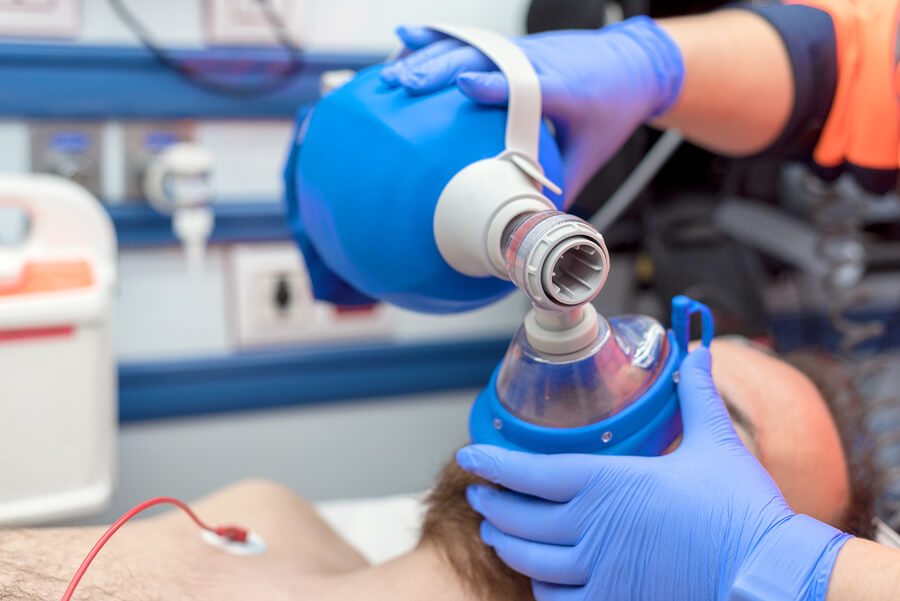
Alcohol intoxication is a temporary condition caused by consuming alcohol, usually in an attempt to experience euphoria or as a social lubricant. Severe alcohol intoxication is commonly referred to as alcohol poisoning and is potentially life-threatening.
Alcohol intoxication is most commonly the result of ethanol contained in commercial or homemade alcoholic beverages, such as beer, wine, and liquor. However, there are several other types of alcohol that be found in a variety of sources that include methanol, isopropanol, and ethylene glycol. These poisonings are uncommon are not addressed in this article, but more information including individual effects and treatment can be found here.
Alcohol consumed orally is absorbed into the blood through the small intestine and the stomach. Because the body absorbs alcohol faster than the liver can metabolize or eliminate it, blood alcohol concentrations (BAC) continue to rise with consumption and peak between half an hour and ninety minutes thereafter.
Increasing levels of blood alcohol can eventually cause symptoms such as dizziness, nausea, vomiting, sleepiness, and the characteristic changes in speech and motor skill impairments that are closely associated with drunkenness.
Risk of Alcohol Intoxication
Alcohol is a central nervous system (CNS) depressant, which is a type of substance that decreases activity in the brain and can reduce the body’s reaction time. The absorption rate of alcohol and risks related to alcohol intoxication depends on a number of factors, including the amount and percentage of alcohol consumed, the period of time in which it was ingested, presence or absence of food in the stomach, and individual factors including tolerance, weight, sex, and other substances in the person’s system.
For example, individuals who do not drink alcohol often tend to get more intoxicated more quickly and more intensely than those who drink alcohol regularly—although this is not always the case. Also, women and younger adults may become drunk more easily than men, due to differences in body size and fat composition and variations in each person’s system’s ability to process alcohol.
Binge drinking is the most common cause of alcohol intoxication and alcohol poisoning and is defined as drinking 4 or 5 units of alcohol in a two-hour time frame for women and men, respectively. In the U.S. one unit of alcohol is considered to be approximately one ounce of liquor, 5 ounces of wine, or 12 ounces of beer.
Signs and Symptoms of Alcohol Intoxication
Early effects of alcohol intoxication may include accelerated heartbeat, feelings of confidence and well-being, facial flushing, and impaired motor coordination.
Symptoms of worsening alcohol intoxication include:
- Reduced inhibition
- Nausea and vomiting
- Reduced attentiveness
- Slurred speech
- Impulsive movements
- Sleepiness
- Stupor
- Blackouts
- Loss of consciousness
People with very severe intoxication may also become very cold, dehydrated, and suffer seizures.
Levels of Alcohol Intoxication
Because everyone processes alcohol differently, the amount of alcohol it takes to cause each individual to exhibit the numerous degrees of intoxication also varies. However, the levels of alcohol intoxication can generally be grouped as follows:
Mild Alcohol Intoxication

Symptoms of mild alcohol intoxication, which is typically reflective of a BAC of between .02-.05%, may include talkativeness, feelings of relaxation and sedation, and minor impairments in fine motor coordination.
Moderate Alcohol Intoxication
Moderate alcohol intoxication, which is typically a BAC of between .05-.20%, may include the following symptoms:
- Poor fine motor coordination
- Uncontrolled eye movements
- Clumsy and unsteady gait
- Reduced reaction time
- Slurred or incoherent speech
- Impaired judgment
- Altered sense perception
- Mood swings
- Changes in personality
- Uncharacteristic behavior
- Loss of inhibitions
- Memory impairment
Severe Alcohol Intoxication
Symptoms of severe alcohol intoxication are typically associated with a BAC of greater than .20% and may include the following:
- Nausea and vomiting
- Dizziness
- Problems speaking
- Double vision
- Amnesia
- Delirium
- Feeling very cold
- Lethargy
- Respiratory depression
- Seizures
- Stupor
- Coma
- Death
In people who do not regularly consume alcohol, a level of .40 or above may be lethal—an event better known as alcohol poisoning. People with alcoholism can usually drink more alcohol than others and therefore have higher blood alcohol levels without exhibiting symptoms of intoxication as intensely. Nonetheless, alcohol poisoning can result in sudden death due to respiratory depression and heart arrhythmia (irregular heartbeat).
People observing a person at this level of intoxication may notice the following signs:
- Strong alcoholic breath
- Vomiting
- Slow breathing
- Enlarged pupils
- Rapid eye movements
- Flushing of the face
- Disorganized speech
- Incoherence
- Lack of alertness
- Semi-consciousness
- Stupor
- Unresponsiveness
When to Seek Medical Help
Some complications from alcohol poisoning require immediate emergency medical attention, including breathing problems, uncontrollable vomiting, chest pain, and seizures. If a person becomes semi-conscious or unconscious and is experiencing severe vomiting, it is important to monitor them to minimize the risk of inhalation of vomit. Aspirated vomit can result in death by suffocation, or can cause a bacterial infection in the lungs.
To reduce the risk of vomit being inhaled, place the person on their side, facing slightly downwards, supported by bent limbs. A person in this condition must be closely supervised, and their caregivers should seek emergency medical help for them immediately. Tragically, people who binge often drink rapidly—that is, those who consume very large amounts of alcohol in a brief period risk drinking a lethal amount of alcohol even before signs of intoxication become evident.

Treating Alcohol Intoxication
Treatment of alcohol intoxication primarily involves the administration of fluids and the management of nausea and vomiting. People who are mildly to moderately intoxicated will eventually process the alcohol without significant complications and improve with time. People with severe alcohol intoxication, however, often need medical evaluation or hospitalization to receive fluids intravenously and to manage complications such as seizures or difficulty breathing.
Those in the presence of someone who is drunk should take steps to make sure that they are safe, conscious, and are not vomiting uncontrollably or showing signs of having difficulty breathing. If the person is unresponsive, unconscious, and vomiting or exhibiting signs of respiratory distress, seek medical care immediately, especially if the person’s condition worsens or does not show any improvement in a reasonable amount of time.
Other Serious Complications of Alcohol Intoxication
Hyponatremia (severe sodium imbalance in the body) is a potentially life-threatening condition that may occur in those who vomit uncontrollably and cannot keep down electrolyte fluids or food.
Dysrhythmia is a condition in which the intoxicated person experiences heart arrhythmias after binge drinking.
Pancreatitis is a condition characterized by severe inflammation of the pancreas and can manifest soon after binge drinking. Acute pancreatitis can be deadly and is considered a medical emergency.
A lack of coordination and slowed reaction time increases an intoxicated person’s risk of injury from falls, burns, car accidents, stunts, etc. If a drunk person becomes belligerent and aggressive, which is common, this can lead to heated arguments, fights, and assaults that injure either the intoxicated person or those around him or her. In turn, these drunken actions can lead to legal ramifications.
Treatment for Alcoholism
People who become intoxicated often and find it difficult to control their drinking should seek professional help as soon as possible. Midwood Addiction Treatment offers a comprehensive approach to substance abuse that includes therapeutic services vital to the recovery process, such as psychotherapy, counseling, group support, and more.
If you or someone you love has a drinking problem, please contact us as soon as possible to discuss treatment options. Discover how we help people free themselves from drugs and alcohol once and for all!